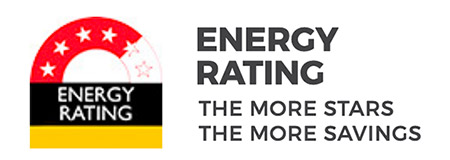Frequently Asked Questions About Air con
Generic
-
What is an energy rating label?
The Energy Rating Label is a Government regulated labelling system that represents the energy efficiency and running costs of appliances. Efficiency is rated by stars; the more stars, the higher the efficiency. When an air conditioner has a high star rating for energy efficiency it will be able to reach desired temperatures using less power, therefor have lower running costs than an air conditioner with a low star rating.
Tip: Choose which size and unit type that is best suited for your property, then use the star rating to compare them.

-
How do I know which type of air conditioner to install?
There are various types of air conditioner systems that come with several different functionalities and features. What air conditioner unit will be best suited to you will be dependent on factors such as;
- Location/climate/humidity
- Is cooling and heating required?
- What type and size property you have?
- How many rooms need cooling/heating?
To help you decide read our Quick & Easy Aircon Buying Guide
-
How do I calculate what size air conditioner I need?
To ensure optimum comfort and energy efficiency you’ll want to consider the size space or room size that you are looking to install your new air conditioning unit in. In general, residential air conditioning units will range from 2kW – 9kW.
A low powered air con unit in a large space will struggle to maintain a desired temperature and therefore must work harder, shortening its lifespan. A larger system in a small room will not be cost efficient due to higher upfront and running costs.
As a basic guide it is recommended that an air conditioner should have approximately 125 watts of power for every square meter of area it supposed to cool/heat.
Use the below formula and table to help assist in determining what size will be suitable for your space.
m² X 125watts = Recommended Air Con Unit SizeSize Room Or Space Air Con Unit Size (approx.) Aircon Unit Type < 20m² 2kW-4kW – Portable
– Small Split System
– Window Box20m²-40m² 4kW-6kW – Window Box
– Split System40m² 6kW-9kW – Split System Multiple rooms or entire house 9kW+ – Multi Split
– Ducted -
What is the ARC tick?
The ARC Tick is an accreditation given to applicable businesses by the Australian Refrigeration Council, indicating they, and their staff, are appropriately licenced and authorised to complete refrigeration and air conditioning works.
Businesses and electricians with the ARC tick are required to comply with the legally mandated standards of how to treat the release of fluorocarbon into the environment. Using a business accredited with the ARC tick helps protect the environment and reduce greenhouse gas emissions from refrigerants.


-
When will I need to replace my air conditioner?
The lifespan of an air conditioner system will be dependent of a few factors including; unit type, model, brand, average usage, maintenance etc. However, the typical air conditioning system will have a lifespan from 10- 20 years. There are a few warning signs that will indicate it is either time to have your air conditioner serviced or replaced.
Things to look out for are;
- Turning itself off without reaching desired temperature
- Decrease in air flow
- Inconsistency in performance
- Leaking liquid or excess moisture
- Odd sounds or smells
-
How can I lower my air conditioners carbon footprint, running costs, energy use and maintenance costs?
These can all be minimised by:
- Buying an energy-efficient system that is the right size for your space
- Having a correctly installed system in the right location of your home
- Improving the energy efficiency of your home (e.g. insulation, tinted windows, outdoor shading of windows)
- Having your unit regularly maintained by a professional will also help to reduce your air con carbon footprint and running costs.
-
What is a reverse cycle air conditioner?
A Reverse Cycle Air Conditioner, or Reverse Air, is another term for a heat pump system which refers to a unit that functions for both heating and cooling.
-
What is an inverter?
Air conditioners inverters will the system the functionality to alter their speed in response to cooling demand. Some will have an initial period where they’ll run at a slightly higher or lower temperature for a set time to bring the area, room or house to your desired temperature. When it reaches the desired set temperature, it reduces the capacity to maintain the consistency of that set temperature, without cycling [on and off] as much as a non-inverted unit would.
-
What does EER mean?
EER stands for Energy Efficiency Ratio
An air conditioner’s efficiency is measured by the energy efficiency ratio (EER). The EER is the ratio of the cooling capacity (in British thermal units [Btu] per hour) to the power input (in watts).
-
What is MEPS?
Minimum Energy Performance Standards (MEPS) specify the minimum level of energy performance that appliances, lighting and electrical equipment (products) must meet or exceed before they can be offered for sale or used for commercial purposes.
-
Does running on dry mode save me money
Having the air conditioner on dry mode uses less energy, meaning it costs less to run. However dry mode doesn’t act like a dehumidifier so it will be limited in its ability to reduce humidity levels.
Installation
-
What is the best location to install units?
Indoor units should be installed in a central in the room and high up on the wall, so it provides airflow throughout the room evenly. Try install in a location that you can reach for cleaning if needed.
Outdoor units for split systems are generally installed against the outside wall of the room being air conditioned. A qualified installer will assist in ensuring the unit is installed in an area where it won’t vibrate or break noise pollution laws.
-
Can I put a cover over the front of my outdoor unit to make it less visible?
The outdoor unit of a split air conditioner system needs to have adequate clearance around it to ensure it operates correctly. A qualified installer may be able to provide some recommendations to conceal the outdoor unit safely
Maintenance
-
What maintenance is required from me for my new air conditioner?
An air conditioner’s filters, coils, and fins require regular maintenance for the unit to function effectively and efficiently throughout its life. Neglecting maintenance will result in a steady decline in the air conditioners performance and lifespan. At a minimum you should clean your air conditioner’s filters every 2 weeks, as any build-up of dust or dirt will restrict airflow and reduce the energy efficiency and capacity of your system.
-
How do I clean the air filters of my air conditioner?
In the operation manual that comes with your air conditioner there should be instructions on this. Most air conditioner units will require you to remove the front panel of the unit, then vacuum dust and wash the air filter with natural detergent and water. Allow the filter to dry outside in a shaded area before reattaching.
For outdoor units you should wipe them down every few weeks and ensure no leaves are getting caught up near.
-
How much does it cost to service an air conditioner?
Air conditioner repairers will usually charge per hour and some may also have a call-out fee. Typically, per hours costs range from $60-$110. The duration of time spent repairing your air conditioner will be dependent on whether you require a routine service or a complicated repair.










